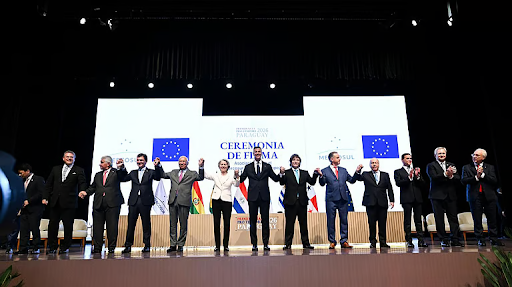



PM Narendra Modi met Canadian PM Mark Carney at the G7 Summit, emphasizing the importance of India-Canada ties. They discussed trade, energy, AI, and anti-terror cooperation, agreeing to restore high commissioners and stabilize relations through mutual respect, rule of law, and sovereignty, marking a step toward rebuilding trust.

Copyright infringement not intended
Picture Courtesy: THE HINDU
The 51st G7 Summit was held in Kananaskis, Alberta, Canada.
The Group of Seven (G7) is an informal grouping of seven of the world's advanced economies: Canada, France, Germany, Italy, Japan, the United Kingdom, and the United States, with the European Union also participating. These nations meet annually to discuss pressing global economic and political issues.
From G6 to G7Formation (1975) => It began as the "Group of Six" (G6) with leaders from France, West Germany, Italy, Japan, the United Kingdom, and the United States meeting to discuss the global economy. Canada Joins (1976) => The group expanded to become the G7 with the inclusion of Canada. The G8 Phase (1998-2014) => In 1998, Russia was formally invited to join, creating the "Group of Eight" (G8). This was seen as a move to encourage cooperation with post-Soviet Russia. Return to G7 (2014) => Russia was suspended from the group in 2014 following its annexation of Crimea. The remaining members reverted to the G7 format, which has continued since. |
The summit in Canada was overpowered by several concurrent global events and internal disagreements, effectively turning the "G7" into a "G6" following President Trump's exit.
Failure to Reach Consensus on Ukraine
Inability to issue a strong, joint statement condemning Russia's war in Ukraine. The United States resisted a strongly worded condemnation, wishing to maintain its negotiating leverage, which led Canada, as the host nation, to scrap the planned joint statement.
Despite the lack of a unified front, individual members announced support for Ukraine. Host Canada pledged 1.47 billion in new military assistance for Kyiv.
Ukrainian President Volodymyr Zelenskyy, who attended the summit, expressed that diplomacy is in a "state of crisis" and urged leaders to pressure Russia to engage in serious peace talks.
U.S. President Trump's Short Departure
Focus on Israel-Iran Conflict => President Trump left the summit a day early to address the escalating conflict between Israel and Iran from Washington. His departure weakened the summit's impact and collective authority.
Shift in U.S. Priorities => The recent move highlighted a shift in U.S. focus towards the Middle East, leaving European allies and Canada to address the Ukraine crisis. President Trump used the summit to suggest that Russia should be readmitted to the group.
|
Bilateral Meetings on the Sidelines India-Canada Reset => Indian Prime Minister Narendra Modi, attending as an outreach guest, held a meeting with new Canadian Prime Minister Mark Carney.
PM Modi held several other bilateral meetings with leaders from Germany, Mexico, and South Korea. |
Other Agreements
While major political agreements faltered, the G7 nations manage to sign joint statements on less controversial issues, including:
Must Read Articles:
Source:
|
PRACTICE QUESTION Q. Critically analyze the role of the G7 in shaping international economic policies. 150 words |



© 2026 iasgyan. All right reserved